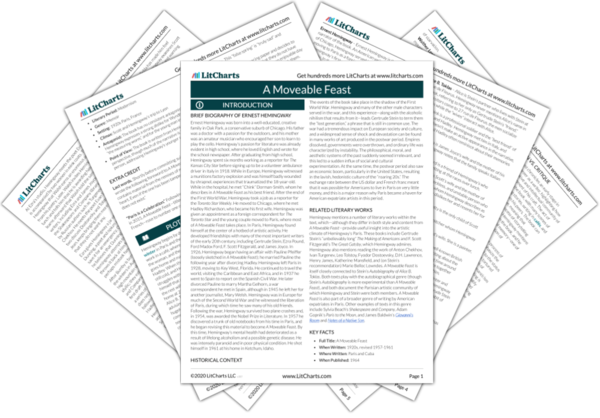Summary
Analysis
When the spring comes, even when it is “false,” the only question is “where to be happiest.” People can also restrict happiness, and, for that reason, Hemingway avoids making plans with others. He wakes early and works while Hadley keeps sleeping. The shops are still shut and a goatherd walks along the street selling goat milk. Hemingway buys a racing paper and decides that after he finishes work that day, he and Hadley will go to the horse races. Hadley asks him if they have enough money to bet, and Hemingway replies that they don’t really but they can “spend what we take.” He apologizes to Hadley for being tight with money; he knows that their poverty has been hard on her. Hadley never complains, and, despite the reality of their situation, neither of them accepts that they are really poor. They still manage to eat well (if cheaply), drink, sleep well, be warm, and love one another.
This scene highlights a less blissful side to Hemingway and Hadley’s marriage. While Hemingway is happy to live in poverty as he is enriched by the satisfaction found in his work, he feels guilty about not being able to provide a better life for Hadley. At the same time, he implies that—to a certain extent—they have a kind of “mind over matter” power over their material circumstances. Although they must deal with the reality of their impoverishment, they are also able to pretend not to be poor as a result of the fact that they can still live an enjoyable life in Paris. Furthermore, they are sustained by their love for each other, which makes them forget their lack of money.
Themes
Hemingway and Hadley decide to go; they will take the train and bring sandwiches to save money. Hemingway checks that there isn’t something else Hadley would rather spend money on, and she replies that there isn’t. Once there, they drink wine from the bottle and someone Hemingway knows gives them two horses to bet on. They win, saving half the money and placing the rest of it on a second horse, who also wins. They drink champagne and collect their winnings. It is now spring, and they have lots of money.
This scene emphasizes the extent to which Hemingway and Hadley are “lucky” at this point in their lives. Despite their challenging circumstances and lack of money, they manage to create happiness and—through sheer good fortune—live a fun and even luxurious life together in Paris. The arrival of spring further underlines Hadley and Hemingway’s good fortune.
Themes
Later that year, Hadley and Hemingway get lucky at the races again and they stop for oysters, crab, and wine at a restaurant on their way home. After, they walk through the Tuileries to look at the Arc du Carrousel, Concord, the Arc du Triomphe, and the Louvre. They talk about memories of times spent with their friend Chink. Hadley says she remembers Hemingway and Chink discussing how to write in a way that is true rather than descriptive. Hadley says that she was “included” in all the conversations, unlike “being a wife at Miss Stein’s.” They discuss the food they ate and the wine they drank and they say that they will “always miss Chink in the winter and the spring.” Hemingway explains that Chink is a professional soldier, whom Hemingway met in Italy, and who is Hemingway’s “best friend.” Hadley says that she and Hemingway are “too lucky” and that she hopes Chink will come to visit them. She adds: “he will take care of us.”
Hemingway and Hadley’s walk past Paris’ landmarks confirms the notion that they are living a spectacularly lucky, magical existence. Hadley’s comment about being “included” in Hemingway’s conversations with Chink indicates that she appreciates being made to feel like a valued and important participant in Hemingway’s world, rather than a “wife” pushed to the sidelines. Hemingway doesn’t seem to oppose Hadley’s desire to be included, but neither does he advocate for her when she is treated dismissively at 27 rue de Fleurus. It is thus unclear whether Hemingway prefers when Hadley is included in the conversation or not.
Themes
Hemingway asks if Hadley is hungry again, and she replies “of course.” They agree to have a “grand dinner” at Michaud’s, which to them is “an exciting and expensive restaurant.” There they see James Joyce, his wife Nora, and their two children, who are all speaking Italian to each other. They are both hungry, and Hadley comments that they were “lucky today.” Hemingway replies that they were, but that they also had good information about the races, and Hadley replies that Hemingway is such a “literal boy” and that she meant they were lucky in general. They note that Chink doesn’t like racing, but that they want to keep going. They have “a wonderful meal” at Michaud’s and afterwards they have sex at home. When Hemingway wakes in the morning, the moonlight is shining on Hadley’s face. He thinks that “life seemed so simple,” but that they were young in an old city and that nothing is truly simple in Paris—not even someone who lies beside you in the moonlight.
Once again, Hemingway depicts a scene characterized by good fortune, youthful innocence, and joy in everyday life. His and Hadley’s continued luck at the races means they can sample sides of Paris previously closed off to them, such as the expensive restaurant Michaud’s. Because James Joyce and his family dine there, Michaud’s comes to symbolize not only luxury and feasting but also literary success and fame. It is an aspirational place, a glimpse into the future Hemingway hopes to make for himself. However, once again, Hemingway provides an ominous reminder that his and Hadley’s good luck will not last forever.
Themes
Get the entire A Moveable Feast LitChart as a printable PDF.













